Set a rampart about my mind, O my Savior, for I make bold to sing the praises of Your most pure Mother, the rampart of the world. Establish me firmly within the fortress of my words and make me strong within the defenses of my thoughts: for You promise to fulfill the petitions of those that entreat You with faith. Endue me with a tongue and ready speech, and with thoughts that are without shame: for every gift of enlightenment is sent down from You, O guiding Light, Who dwelt within her virginal womb (Ikos, Matins for Dormition).
A necessary secret
There is a reason why we bless flowers today. It is because this precise loveliness of the blooms, their blossoming joy, expresses a secret that we need to understand.
This secret is necessary for life, for breath, for joy.
It is something that must be learned to be human.
It is a secret that you have to memorize before you die, so that death will not be death for you, but only, as Jesus called it, “sleep”—“dormition” (which is another word for “sleep”).
The secret of the flowers is this:
Mary is the Mother of God. She gave human life to her Son and her God.
And when it came time to die—as she must, as all human who are under the “wages of humanity’s sin” must die—her Son and her God gave her unending life.
The Fall of humanity—of Adam and Eve in the Garden of Eden—utterly broke the world in sin and brought death as a consequence into all creation. Mary, as the Church teaches, was sinless—which is always a possibility for every human being: you never “have” to sin. Sin is prevalent. Sin might even be inevitable. But it is never necessary. People have asked before: “Doesn’t St Paul say that all have sinned and fallen short of the glory of God (Romans 3.23)? In this verse, the Apostle is saying that the entire human race—those under the Jewish Law and those outside of the Law—are afflicted by the age of sin that Adam started at the fall. There is no one—not even the Theotokos—that does not absolutely need the gift Jesus offered on the Cross.
So here is the important thing: sinlessness does not get you into heaven … despite her sinlessness, Mary, because she was human, had to die. Sin is not necessary: but because of sin, death is.
Death was never ever natural. But it surely became normal. We would do well not to confuse those two words: this is exactly the way the world thinks, and thus this is not a good way to think at all.
Despite this cruel power and universality of death, “her Son and her God” gave the Virgin Mary unending life. He has the power to give life because He is the One Who took power away from death: the Cross healed humanity from the cancer of sin, and Jesus’ descent into Hell demolished its prison gates.
He, at the Dormition, in the first explicit image (or “icon”) of Christian death (or better, “dormition”) gave Real Unending Life to His Mother: just as you would expect the Son—Who is God—would do for His Mother—who is the Mother of God:
The angelic powers were amazed as they looked in Zion upon their own Master, bearing in His hands the soul of a woman: for as befitted a Son, He said to her who without spot had borne Him: ‘Come, honored among women, and be glorified together with your Son and God (Canticle Nine, Matins of Dormition).
At the Dormition, Jesus confirmed to the human race—and all history—that Christian death is neither final nor is it absence. Christian death is sleep for the body, and presence with the Lord (2 Corinthians 5.8).
The secret is Wisdom
The flowers know this. That secret—of eternal life coming into this world—is the “wisdom” of why flowers look beautiful. All beauty expresses this secret, this wisdom, this simple but totally surprising whisper that the “secular” machine world of meanness (and meaninglessness) will never get quiet enough to hear.
Mary said yes to God, and received the Holy Spirit, and gave life to the very One Who gave her life in the first place. She became His Eden in her womb, and she became, as the bearer of this Divine Life unified with Humanity, like the Flaming Tree that would not burn that Moses turned aside and gazed upon … she became like the East Gate of Jerusalem that no one else could enter.
Every flower, every event of Beauty, is built on this Wisdom which lies as the deep poetry underlying all creation:
Let the high mountains ring out to the Trumpet of the Spirit: let the hills now rejoice and let the apostles of God dance for joy. The Queen goes to dwell with her Son and to rule with Him for ever (Canticle Seven, Matins for Dormition).
He made them beautiful for her
Flowers cannot be beautiful without the Virgin. Jesus, the Artist of creation, designed them all for her, every single one, and for every human heart that sees life the way she does, who learns and receives her wisdom. After all, she didn’t “just happen” to be a convenient volunteer, as if just “anyone would do”—such a notion goes against everything the Orthodox Church has ever believed:
The Spotless Bride, the Mother of Him in whom the Father was well pleased, she who was foreordained by God to be the dwelling place of His union without confusion, delivers today her blameless soul to her Creator and her God. The spiritual powers receive her with the honors due to God, and she who is truly the Mother of Life departs unto life, the lamp of the Light which no man can approach, the salvation of the faithful and hope of our souls (Verse at the Lity, Vespers for Dormition).
She was “foreordained.” There was never a time when the Virgin was not going to be the Mother of God. There was never a time when the Son of God was not going to become Man—even if Adam had never sinned, Jesus would still have become born of the Virgin Mary by the Holy Spirit. She, Mary, was to be His Mother and no other.
We must accept the simple fact that Mary is the most important Christian of all time. She is more important than Saints Peter or Paul. She is more important even than the Angels. She is our one and true example of what a Christian should look like, sound like, act like, think like and most importantly pray like. All families are affected by the personality of the mother: the daily habits of just getting along, going about the day and the way the home is “kept up”—these "effects" are all effected by the woman whose home it is. This is especially true of the Household whose Mother is the Virgin Mary, which is the Church—the Body of Christ. The real, authentic Church can do nothing other than to reflect the personality of the Theotokos.
It is really no good asking “What would Jesus do?” when you try to make a decision. He is God the Word, Who lives in you and you in Him. But you can ask “What would Mary do?”
And you should.
The Wisdom of the Beatitudes
Of course, you have heard this from me before, probably for over twelve years (and if you count other locales, almost twenty). Sometimes, I feel like a record player on a scratchy 33 LP, when the arm with the needle keeps bouncing back to play the same audio groove over and over again.
If I repeat myself, again and again (paki i paki mirom), it may not be because I can’t think of anything else to say. It may be because it hasn’t been heard (because “hearing” means “doing”), and the song isn’t done. Yet.
Here is that song, again. It is the Beatitudes, of course. I think that when the Lord proclaimed this as the “personality test” of Christians, He was basing it on the character of His Mother, the Virgin Mary.
“What would Mary do?” This:
Blessed are the poor in spirit. The Virgin Mary was so poor that she completely emptied her “selfishness” so that the Holy Spirit could conceive in her God the Word.
Blessed are the meek. Mary’s soul was completely free of violence and meanness. So she could receive the Spirit and bear the Son, Whose character is not cruel, never mad. The Holy Trinity is essentially Meek. That is something you might not have heard before.
Blessed are they who hunger and thirst after righteousness. “Righteousness” is not “I-go-to-church-and-you-don’t-ness.” It is not “I’m-perfect-and-you’re-not-ness.” Righteousness is “I-want-everyone-to-live-in-God-ness.” Righteousness is an overwhelming desire to see God’s beauty shine in everyone and everything. The Theotokos wanted this sort of righteousness. Read her song in Luke chapter one, the Magnificat. She would not (i.e., actually, does not) say that our society is beautiful at all.
Blessed are they who mourn. If you knew God the Artist, God the Maker, and God the Perfecter as much as Mary does—and no one, not even the angels, know God as much as Mary does … and if you knew God’s Wisdom—His plan for the way creation was always meant to be and His plan for how He is bringing about that way, in all its complications …
then, wouldn’t you grieve over the ugliness, the pollution and garbage, the cruelty, the violence and nastiness and selfishness that is in the world? Read the Magnificat, then you’ll understand why the miraculous icon of St. George’s in Taylor, PA, the “Theotokos Kardiotissa,” weeps her tears so redolent of the rose fields of heaven.
Wisdom emotionally responds to the world as it is, and thus Wisdom calls for mourning. So she weeps for the mourning. She weeps for beauty and joy.
Blessed are the pure in heart. This is exactly why the Virgin Mary is blessed: no one was, is or will be purer than her. Rejoice, Mary, full of grace, the Lord is with you! announced the Archangel Gabriel (in Luke 1.28—the usual English translation is “highly favored one,” which is a stripped-down translation that is prejudiced against Mary’s special status). Only the knowledge of God, His Wisdom, was in her heart—no other kind of belief. Only belief can remain in the heart, not information: information is processed in the brain, and it comes and goes, and is not at all “wisdom."
And what you believe is what you choose to become.
If you believe that the world is more “believe-able,” then you will become the world. But if wisdom fills your heart, if you believe in the Holy Trinity, then you will become “grace-ful,” and you will see reality as “creation,” full of God’s glory.
You have a choice. Either you will look at the world and see just the practical world (“it is what it is”). Or you can see creation—with every single thing viewed as a prophecy of eternity, the visible constantly revealing the Invisible. This perception of reality as creation, growing towards universal Transfiguration, is exactly what Wisdom is.
And no one, no human being, no angel (even) is wiser than the Virgin Mary. No one is purer in heart. And she most definitely sees God with her entire soul:
She who is higher than the heavens and more glorious than the cherubim, she who is held in greater honor than all creation, she who by reason of her surpassing purity became the receiver of the everlasting Essence, today commends her most pure soul into the hands of her Son. With her all things are filled with joy and she bestows great mercy upon us (Verse at the Lity, Vespers for Dormition).
Blessed are the merciful. Mercy is kindness and courtesy. Mercy is healing. Mercy is compassion and pity. Mercy is given to friends and family, neighbors and strangers.
Mercy is best summed up, in human nature, by motherhood. Mercy is what mothers do naturally: from the bottom of their hearts, mothers recognize a need and fill that need with themselves, immediately, without hesitation.
On the Cross, Jesus said, Behold, your mother (John 19.27). He did not say this just to John, the beloved disciple. He said it to all His beloved disciples. The logic is pretty simple here: if we Christians are members of His Body (as St Paul says so clearly in 1 Corinthians 12.12-26—and this is to be taken spiritually and thus literally, not just “metaphorically”), then indeed we are her children also, and she is really our mother, since Jesus—Whose Body we are—is really her Son.
I do not know why we have to keep defending the idea that Mary is so special, and that her motherhood is a real treasure. It seems that the Protestant Reformation attempted to scour away from Christianity everything that doesn’t fit into “common sense.” More likely, the Protestant movement was part of a larger secularizing trend that tried to ignore the reality of this visible world actually being a small part of a much greater invisible world. It was like thinking that the tip of the iceberg was all there was, which is a terrible mistake. The Virgin Mary—especially after the Dormition—insists that we accept the fact that the iceberg—the whole creation—is thousands of times bigger than the tip of the iceberg—the sensible world—that we can see, touch and feel.
She insists on this because she is wiser than anyone. The uncreated Wisdom of the Trinity—which is beauty and goodness and truth united in mercy—is best revealed in the created Wisdom that is symbolized by Mary.
So every time we ask for Mary to pray for us, she maternally and emotionally goes to her Son—just like she did at Cana of Galilee (John 2)—and says, They have no wine. Every time the wisdom of mercy is given, water is made into wine.
Blessed are the peacemakers
This world has no real understanding of true Peace: it gets only glimmers and hints. Peace, as we all know if only by hearing it said many times in Liturgy, is certainly much, much more than a ceasefire in the never-ending war of the world.
The absence of war is not peace at all. We are left with politics after the gunfire stops, and that is hardly peaceful.
Peace is only beautification, according to the uncreated Wisdom of God. This is why Peace will always look like the Virgin Mary: she is the perfection of created Wisdom. Peace is the way things were at the beginning: all conflict, all violence is against God’s original culture. Mary, as the fulfillment of created wisdom, shows best the true and beautiful natural state of humanity and creation. The lamb, in the Christian culture of the Theotokos, always lies down safely with the lion.
When we make peace by learning and living wisdom and giving it away in words and deeds and prayers … when we beautiful our souls, our homes, our neighborhoods with the Wisdom of God, then we make peace like the Virgin, and indeed, then and only then, we shall be the children of God. His family, with our mother, could be nothing else.
If you become a peace-maker in the Virgin’s way of peacemaking, then no stronghold could survive you. The gates of hell will crumble all around you. Because through you the beauty and power, the uncreated Wisdom of Christ the Logos, Son of God, will be the One speaking through you. If you become a peacemaker like the Virgin is, then every ice-cold demonic dominion will melt away.
The darkness cannot cover peace: a city set on a hill cannot be hid. The city of the Virgin is the New Jerusalem descending, in the here-and-now. Once again, this is the perspective of Wisdom: the visible revealing the Invisible, “experience”—if you will—articulating the logoi of the Logos, phenomena revealing—if we would only pay attention with our nous—the Artist-Creator, God the Father, the Son and the Holy Spirit.
That is why the Protective Veil of the Theotokos is so protective, even in the shadowlands of this present darkness.
Pay attention to the One Who is here
We live in a mean, cold world where there is too much yelling, too much complaining, too much fighting and contempt, too much demanding, too little belief and loyalty, too little courtesy and respect, too little affection. And unfortunately, it has infected us—like the Zika virus—from too much exposure. Too many Orthodox Christians are too grumpy: maybe this is because they have lapsed into thinking too much the way the world thinks.
Too many of us have forgotten peace and we have let the devil paint over the world black, so that we do not see that creation is really a “mirror of glory”: ... the god of this world hath blinded the minds of them which believe not (2 Corinthians 4.4).
The world says it is practical and realistic. The world deals only with stuff that can be measured. The world is impressed by success and crowds. The world says something is real only if it can be sold. The world demands entertainment and short attention spans. The world suggests that the squeaky wheel gets the grease. The world wants facts and information and despises wisdom.
The world despises the even the merest suggestion of sinlessness. It has exiled the Virgin Mary from its culture, because she knows best the truth behind the world’s deception. To the world, the Theotokos is just an old Palestinian woman, utterly expendable.
The world ignores Wisdom. The world doesn’t value Beauty any more (modernity is now worse than the pagans ever were).
The world counts numbers and measures worth by fame and loudness.
The world pays more attention to empty pews and who is not there, instead of the One Who Is Here and Everywhere.
The here and there of the Virgin
And with Him—He Who Is Here and Everywhere—is the Virgin Mary.
You may ask how this is so. You might say that only God is omnipresent (that is, “everywhere”). And since the Virgin Mary is not God, how can she be everywhere?
But we do not say that she is everywhere. We say just that she is here, with us, in the Body of Christ.
Let us talk, a little bit, about here-ness and there-ness.
First of all, Mary is now in Eternity with her Son. When she fell asleep (as is “normal” for human nature), Jesus came and “assumed” her. He took her soul and her body, and translated her to the true life of resurrection: she lives now in the clear and beautiful Presence of the Uncreated Light:
O pure Virgin, sprung from mortal loins, thine end was conformable to nature: but because thou hast borne the true Life, thou hast departed to dwell with the divine Life Himself (Canticle Three, Matins for Dormition).
Here’s the thing about here-ness and there-ness: first of all, the difference between “here” and “there” falls apart in the “divine Life” which is far above time and space.
A good way of thinking about the presence of the Virgin Mary is that in the Resurrection, she is not “everywhere” as only God can be omnipresent, but her presence is much larger, much deeper than what we are now in our small, closed off individualities. In fact, you can even say that the Virgin Mary is larger than the planet Earth. So of course, then, she is present here at St John’s in East Pittsburgh. She is present at St George’s in Taylor PA. She is present in Jerusalem, in Constantinople and Mt Athos.
Not because she is “everywhere present and fills all things” (because only God is omnipresent and everlasting). But in her Resurrection Life—which today’s Feast of the Dormition celebrates—she is so much greater and larger than our own little individual packets of time and space: and that is why we can say, “she is here.”
O Most Holy Theotokos Save Us
She is both “here” with us, but more importantly, she is with Christ and in His Presence, where there is no separation, no darkness of “closing off” that we experience in this culture of sin and death.
And she is constantly, maternally, asking the Lord to change water into wine.
She does so every time you ask for her intercession. She has the “boldness of a mother” to actually influence the work of her Son.
We believe this fact. We count on it. And frankly, I don’t understand why anyone who calls himself or herself “Christian” doesn’t believe this also. Wouldn’t you want the absolute best one who prays to pray for you? Because that is exactly what we mean at the end of Vespers when we sing, “O Most Holy Theotokos save us!”
No, she didn’t die on the Cross for us: only the pouring out of Triune divinity could save our dead humanity.
But the entire Church—humans and angels—is involved in the process of salvation of humanity and all creation. Every time someone prays for me, they are involved in the saving of me. When your departed grandparents pray for you, they are involved in the saving of you. We are all much involved in each other’s salvation, just as the world of unbelief is much involved with damnation.
And no other Christian is more involved in the salvation of the world—and us—than Mary, full of grace.
Not nearly Marian enough
We fail because we are not “Marian” enough. We do not believe enough.
I think—even in Orthodoxy—there has been an attempt to minimize the faith, to reduce what we believe down to some sort of "mere Christianity," perhaps a "common denominator" that can function as a minimum. Perhaps the Nicene Creed is this.
But I am not competent to pass judgment on the value of minimizing. I just see the sad results. There is a Christianity now that does not pray for the dead or venerate the saints. There is a Christianity that says, openly, that sacraments are either optional or not truly "sacramental" or even wrong. There is a Christianity that actually claims that if something is hard to understand, then that something should not be thought about ... that theology and doctrine must be simplified, or else faith has become "head knowledge" as opposed to "heart knowledge."
And in all this "stripping down" of the true faith, we have Christians who think the world is opaque and are aligned, unknowingly, with the structures of the world.
We have today a Christianity that does not know Mary. And because we don't know her, we really don't know her Son.
We do not live like her, talk like her, think like her, pray like her. We Orthodox talk about evangelism and programs and worry about survival. There is an endless supply of books, articles, podcasts, speeches and anxious meetings about the changing world: it is as if while the global climate is warming, the hearts of Christians are getting colder.
Something, in all this worry, is missing:
We are not like wise like Mary.
We need Wisdom. We need to see the Beauty of God, breathe it in, taste it and drink deeply from its springs. We need to understand Life again as shining with Love. We need to look in wonder at invisible Grace becoming visible in creation. We need to desire God, and to delight in His goodness.
We need to humble ourselves in peace, in beauty, in the meadow of flowers, as did Alyosha in this most poignant, tender scene of Fyodor Dostoevsky’s The Brothers Karamazov:
The silence of earth seemed to melt into the silence of the heavens. The mystery of earth was one with the mystery of the stars....
Alyosha stood, gazed, and suddenly threw himself down on the earth. He did not know why he embraced it. He could not have told why he longed so irresistibly to kiss it, to kiss it all. But he kissed it weeping, sobbing, and watering it with his tears, and vowed passionately to love it, to love it for ever and ever. “Water the earth with the tears of your joy and love those tears," echoed in his soul.
What was he weeping over?
Oh! in his rapture he was weeping even over those stars, which were shining to him from the abyss of space, and "he was not ashamed of that ecstasy." There seemed to be threads from all those innumerable worlds of God, linking his soul to them, and it was trembling all over "in contact with other worlds." He longed to forgive everyone and for everything, and to beg forgiveness. Oh, not for himself, but for all men, for all and for everything. “And others are praying for me too," echoed again in his soul. But with every instant he felt clearly and, as it were, tangibly, that something firm and unshakable as that vault of heaven had entered into his soul. It was as though some idea had seized the sovereignty of his mind — and it was for all his life and for ever and ever. He had fallen on the earth a weak boy, but he rose up a resolute champion, and he knew and felt it suddenly at the very moment of his ecstasy. And never, never, his life long, could Alyosha forget that minute.
"Someone visited my soul in that hour," he used to say afterwards, with implicit faith in his words.
(Whoever loves this passage is truly my friend.)
Alyosha, on a day that had been so full of grief, bowed down in humility and heard the whisper of the flowers, and listened to the wisdom-song of the Virgin Mary.
Alyosha entered into the sweet wisdom of Mary, who is so wise and so much of an example to us that sometimes she is called “Wisdom” herself.
Alyosha became meek, and beauty flowed into his heart and never left.
Wisdom calls
This, nothing less, is what I believe.
This, nothing else, is wisdom, if we would take it:
She has sent out her maidens, She cries out from the highest places of the city, “Whoever is simple, let him turn in here!” As for him who lacks understanding, she says to him, “Come, eat of my bread And drink of the wine I have mixed. Forsake foolishness and live, And go in the way of understanding” (Proverbs 9.3-6)
Listen to the flowers today.
She speaks, in beauty.

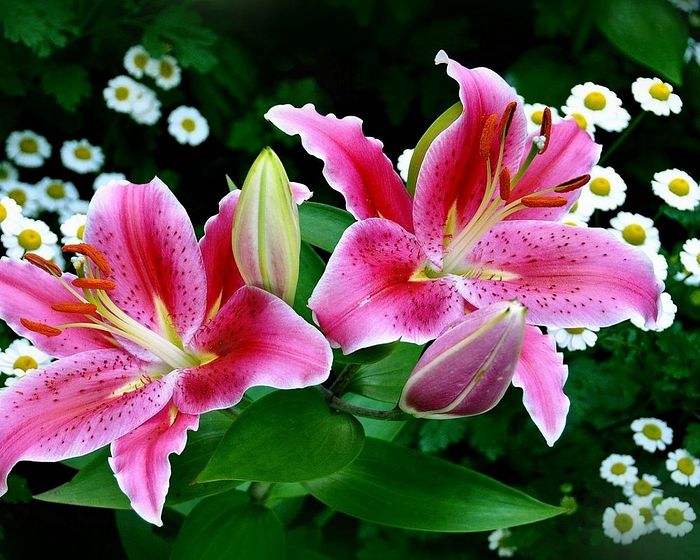
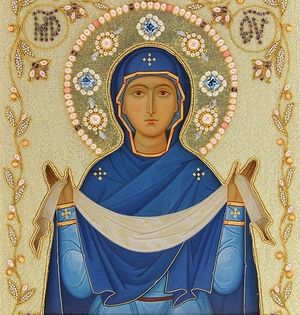
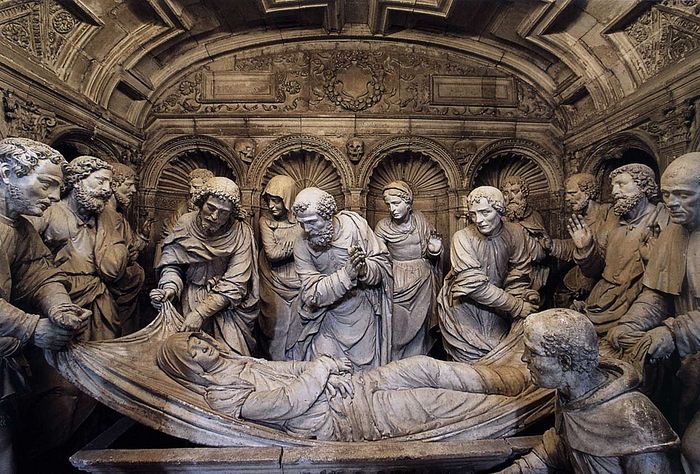
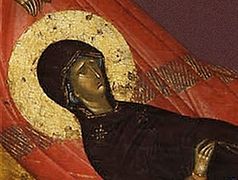
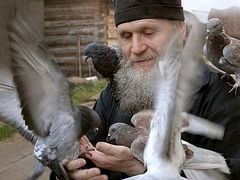
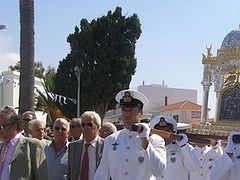
Indeed, beauty is a promise of happiness!
A promise which is never going to be fulfilled for whoever pursues it in this world.
No matter how hard he tries, no matter how much wealth and power he piles up to get it, that thirst is never going to be satisfied.
That's because beauty does not belong to this world and you cannot possess it. Indeed, you cannot possess anything, as you have nothing which has not been given to you. You are the image of the Most High God, but nothing is left of an image when it's separated from its source.
Beauty is the most direct, immediately accessible, language of God, Whom belong everything, and only in Him that promise can be fulfilled.
May the Lord give to every man this understanding.
==========================
If the Most Holy creature was foreordained to be the Mother of God, Adam was foreordained to sin.
There cannot possibly be any different understanding of this.
They are foreordained (as everybody else) only in the absolute omniscience of God, Who outside of time knows everything that our free will is going to choose in time.